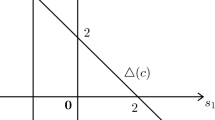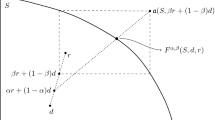Abstract
We allow the reference point in (cooperative) bargaining problems with a reference point to be endogenously determined. Two loss averse agents simultaneously and strategically choose their reference points, taking into consideration that with a certain probability they will not be able to reach an agreement and will receive their disagreement point outcomes, whereas with the remaining probability an arbitrator will distribute the resource by using (an extended) Gupta–Livne bargaining solution (Gupta and Livne in Manag Sci 34:1303–1314, 1988). The model delivers intuitive equilibrium comparative statics on the breakdown probability, the loss aversion coefficients, and the disagreement point outcomes.


Similar content being viewed by others
Notes
For \(x, y \in \mathbb {R}^n\), the vector inequalities are given as: \(x \ge y\), \(x>y\), and \(x \gg y\).
Alternatively, one can capture the cases in (i) and (ii) via the strategic game form instead of by extending the bargaining solution. We chose the latter alternative for reader-friendliness.
This is similar to Nash’s probabilistic extension of his non-cooperative demand game where agents receive their disagreement point payoffs with probability p and their claims with probability \(1-p\) in case of a conflict (see Nash 1953).
Sarver (2012) also modeled agents who make a conscious and optimal choice of their reference points (in an individual decision making context).
Nevertheless, R will not be above the weak Pareto frontier in any equilibrium. We will formally argue this in the proof of Proposition 1.
To the best of our knowledge, there is only one alternative to GL, which is the tempered aspirations solution proposed by Balakrishnan et al. (2011). This solution concept is similar to GL in that it also employs a reference point. An important observation for our purposes is that the utility it yields to an agent is also convex in the agent’s reference point. Hence, we think that GL and its alternative would lead to qualitatively similar results.
References
Ashenfelter O, Bloom DE (1984) Models of arbitrator behavior: theory and evidence. Am Econ Rev 74:111–124
Balakrishnan PV, Gómez JC, Vohra RV (2011) The tempered aspirations solution for bargaining problems with a reference point. Math Soc Sci 62:144–150
Bartling B, Schmidt KM (2015) Reference points, social norms, and fairness in contract renegotiation. J Eur Econ Assoc 13:98–129
Bazerman MH (1985) Norms of distributive justice in interest arbitration. Ind Labor Relat Rev 38:558–570
Blount S, Thomas-Hunt MC, Neale MA (1996) The price is right—or is it? A reference point model of two-party price negotiations. Organ Behav Hum Decis Process 68:1–12
Bolton GE, Karagözoğlu E (2016) On the influence of hard leverage in a soft leverage bargaining game: the importance of credible claims. Games Econ Behav 99:164–179
Bozbay I, Dietrich F, Peters H (2012) Bargaining with endogenous disagreement: the extended Kalai–Smorodinsky solution. Games Econ Behav 74:407–417
Brito DL, Buoncristiani A, Intriligator MD (1977) A new approach to the Nash bargaining problem. Econometrica 45:1163–1172
Compte O, Jehiel P (2004) Bargaining with reference dependent preferences. Mimeo, Paris School of Economics
Delfour MC (2012) Introduction to optimization and semidifferential calculus. Society for Industrial and Applied Mathematics, Philadelphia
Driesen B, Perea A, Peters H (2011) The Kalai–Smorodinsky bargaining solution with loss aversion. Math Soc Sci 61:58–64
Driesen B, Perea A, Peters H (2012) Alternating offers bargaining with loss aversion. Math Soc Sci 64:103–118
Ellingsen T, Miettinen T (2008) Commitment and conflict in bilateral bargaining. Am Econ Rev 98:1629–1635
Ellingsen T, Miettinen T (2014) Tough negotiations: bilateral bargaining with durable commitments. Games Econ Behav 87:353–366
Gächter S, Riedl A (2005) Moral property rights in bargaining with infeasible claims. Manag Sci 51:249–263
Gupta S, Livne ZA (1988) Resolving a conflict situation with a reference outcome: an axiomatic model. Manag Sci 34:1303–1314
Hyndman K (2011) Repeated bargaining with reference-dependent preferences. Int J Game Theory 40:527–549
Kahneman D, Tversky A (1979) Prospect theory: an analysis of decision under risk. Econometrica 47:263–291
Karagözoğlu E, Riedl A (2015) Performance information, production uncertainty, and subjective entitlements in bargaining. Manag Sci 61:2611–2626
Köszegi B, Rabin M (2006) A model of reference-dependent preferences. Q J Econ 121:1133–1165
Kristensen H, Gärling T (2000) Anchor points, reference points, and counteroffers in negotiations. Group Decis Negot 9:493–505
Luce D, Raiffa H (1957) Games and decisions. Wiley, New York
Muthoo A (1992) Revocable commitment and sequential bargaining. Econ J 102:378–387
Nash JF (1953) Two-person cooperative games. Econometrica 21:128–140
Sarver T (2012) Optimal reference points and anticipation. Working paper, Duke University
Shalev J (2000) Loss aversion equilibrium. Int J Game Theory 29:269–287
Shalev J (2002) Loss aversion and bargaining. Theor Decis 52:201–232
Thomson W (1981) A class of solutions to the bargaining problem. J Econ Theory 25:431–442
Vartiainen H (2007) Collective choice with endogenous reference outcome. Games Econ Behav 58:172–180
Acknowledgements
We would like to thank two anonymous reviewers and an associate editor for their constructive comments, which improved the paper. Emin Karagözoğlu acknowledges financial support from Bilim Akademisi (The Science Academy, Turkey).
Author information
Authors and Affiliations
Corresponding author
Rights and permissions
About this article
Cite this article
Karagözoğlu, E., Keskin, K. Endogenous reference points in bargaining. Math Meth Oper Res 88, 283–295 (2018). https://doi.org/10.1007/s00186-018-0636-2
Received:
Accepted:
Published:
Issue Date:
DOI: https://doi.org/10.1007/s00186-018-0636-2




